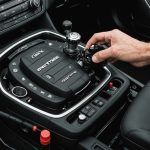Top Battery Chargers for UK-Made Electric Vehicles: Which One Packs the Best Efficiency?
As the world shifts towards a more sustainable and environmentally friendly mode of transportation, electric vehicles (EVs) are becoming increasingly popular. One of the crucial components of owning an EV is the battery charger, which can significantly impact the overall efficiency, convenience, and cost of owning an electric car. In this article, we will delve into the top battery chargers for UK-made electric vehicles, exploring their features, benefits, and what makes them stand out.
Understanding the Basics of Electric Vehicle Charging
Before we dive into the best battery chargers, it’s essential to understand the basics of EV charging. Electric vehicles use lithium-ion batteries, which can be charged using various methods, including slow charging, fast charging, and rapid DC charging.
In the same genre : Exploring the Benefits of Multi-Zone Climate Control in UK Family Vehicles: Why It’s a Game Changer
- Slow Charging: This method uses lower currents and is typically done at home using a standard 230V socket or a dedicated home charger. It is more gentle on the battery but takes longer, often several hours, to fully charge the vehicle[1][4].
- Fast Charging: This method uses higher currents and can charge the vehicle to 80% in about 30 minutes. However, it generates more heat, which can affect the battery’s longevity[1].
- Rapid DC Charging: This is the fastest method, using direct current to charge the battery. It can charge the vehicle from 20% to 80% in as little as 22 minutes, making it ideal for public charging stations[4].
Top Battery Chargers for UK-Made Electric Vehicles
Home Chargers
For home charging, several options stand out for their efficiency, ease of use, and compatibility with UK-made electric vehicles.
V2C Trydan Charger
- Power Output: Up to 7.4 kW in monophase and 22 kW in triphase.
- Compatibility: Compatible with the Fiat 500e and other UK-made EVs using a Type 2 connector.
- Features: Intelligent charging that optimizes energy use based on available energy levels and electricity tariffs. Installation is professional and certified[2].
- Price: The cost includes the charger and installation, with potential subsidies covering up to 70% of the installation fees.
IZI by EDF Home Charger
- Power Output: Up to 7.4 kW in monophase and 11 kW in triphase.
- Compatibility: Suitable for the Mini Cooper SE and other EVs with a Type 2 connector.
- Features: Easy installation, eligibility for a tax credit, and optimized charging based on energy tariffs.
- Price: Starting from £1,583 including installation, with potential tax credits[4].
Public Charging Stations
Public charging stations are crucial for long trips and emergency top-ups. Here are some of the best options:
In parallel : Selecting the Perfect Paint for Your DIY Vintage British Motorcycle Respray: A Comprehensive Guide
Rapid DC Charging Stations
- Power Output: Up to 85 kW or more.
- Compatibility: Compatible with most EVs, including the Mini Cooper SE and Fiat 500e, using a CCS Combo connector.
- Features: Fast charging times, typically 20-80% in 30 minutes or less.
- Price: Varies by network but generally more expensive than home charging, with prices ranging from £5.20 to £7.90 per 100 km[4].
Key Features to Consider
When choosing a battery charger, several factors are crucial to ensure you get the best efficiency and value for your money.
Charging Speed
- Fast Charging: Ideal for public stations and emergency use. However, it can generate more heat, potentially reducing battery life[1].
- Slow Charging: Better for home use, as it is gentler on the battery and can be done overnight.
Compatibility
- Ensure the charger is compatible with your vehicle’s connector type (e.g., Type 2, CCS Combo)[2][4].
Smart Charging
- Look for chargers that optimize energy use based on available energy levels and electricity tariffs. This can help you save money and reduce your carbon footprint[2][4].
Installation and Maintenance
- Professional installation is essential for home chargers to ensure safety and efficiency. Some providers offer certified installation services[2][4].
Comparative Table of Top Battery Chargers
| Charger | Power Output | Compatibility | Charging Speed | Price | Additional Features |
|---|---|---|---|---|---|
| V2C Trydan Charger | Up to 7.4 kW (mono), 22 kW (triphasé) | Type 2 | 6h45 (mono), 4h30 (triphasé) | Includes installation, subsidies available | Intelligent charging, certified installation |
| IZI by EDF Home Charger | Up to 7.4 kW (mono), 11 kW (triphasé) | Type 2 | 3h20 (mono), 2h14 (triphasé) | Starting from £1,583, tax credits available | Easy installation, tax credit eligibility |
| Rapid DC Charging Station | Up to 85 kW | CCS Combo | 30 minutes (20-80%) | Varies by network | Fast charging, widespread availability |
| Ring Automotive RSC804 | 4 A | 6 V, 12 V | Slow | £33.80 | Simple to use, automatic 7-stage charging, jump starter capability |
Practical Insights and Actionable Advice
Optimizing Battery Health
- “The choice between fast charging and slow charging depends ultimately on individual needs and usage habits. Fast charging offers remarkable convenience and quick access to power, making it a preferred choice for users with a busy lifestyle. However, slow charging presents significant benefits for battery health and safety, making it an interesting option for users who prioritize longevity over speed”[1].
Using Solar Panels
- Consider integrating solar panels into your home charging setup. This can significantly reduce your electricity costs and carbon footprint. “Our chargers are compatible with the main inverters on the market, simplifying the installation and allowing the optimization of the charging system through solar energy”[2].
Choosing the Right Charger
- When selecting a charger, consider your vehicle’s specifications and your charging needs. For example, if you have a Mini Cooper SE, a 7.4 kW home charger would be an excellent choice for rapid home charging[4].
Quotes from Industry Experts
- “The purchase of an electric vehicle is just the first step in the electric mobility adventure. That’s why we offer customized charging solutions, ensuring efficient and secure charging in all circumstances”[2].
- “For those seeking high-quality lithium battery solutions, RH has established itself as a sector leader. Since our inception in 2013, we have supplied over 20.4 million battery packs and chargers worldwide, ensuring our products meet the highest performance standards”[1].
Choosing the right battery charger for your UK-made electric vehicle is a critical decision that can impact your car’s performance, your wallet, and the environment. By understanding the different charging methods, considering key features such as compatibility and smart charging, and selecting a charger that aligns with your needs, you can optimize your EV ownership experience.
Whether you opt for a home charger like the V2C Trydan or IZI by EDF, or utilize public rapid DC charging stations, the key is to find a balance between convenience, efficiency, and battery health. As the world continues to embrace electric mobility, making informed choices about your charging solutions will be essential for a seamless and sustainable driving experience.
Brand Comparisons and Reviews
Choosing the best battery charger brands can be daunting, given the plethora of options available in the UK. Many top brands stand out due to their reliability and quality. Leading the pack are brands like Anker, Duracell, and Noco.
These brands have earned a solid reputation for manufacturing reliable battery chargers, prioritising both safety and performance. Anker is widely recognised for its commitment to innovative technology, offering products that consistently deliver on reliability. Duracell mirrors this reliability but with a long-standing reputation, underpinned by years of consumer trust. Meanwhile, Noco brings a robust and durable design, particularly appealing to automotive enthusiasts seeking heavy-duty options.
Consumer feedback overwhelmingly supports the high quality of these brands. Anker users often praise the brand for its efficient charging speed and portability. Duracell users often highlight the longevity and dependability of their products, reflecting trust in a well-established brand. Noco’s users frequently commend the brand for its versatility and rugged nature, ideal for maintaining car batteries in top condition.
Expert opinions often align with consumer experiences, reinforcing that these brands consistently deliver. They highlight the harmonisation of safety features with practical usability as a mark of excellence in battery chargers.
Pricing and Value Assessment
Navigating the world of battery charger pricing can be daunting. Prices can vary significantly, influenced by features and performance attributes. Effective battery chargers can range from £20 to over £150. This spread reflects different models’ capabilities, from basic units to advanced systems with rapid charging and multiple device handling.
A cost comparison reveals that typically, more expensive chargers offer superior performance features. High-end chargers often include faster charging times, extreme durability, and compatibility with a greater variety of batteries. However, selecting the right model should be tailored to your specific needs rather than the steepness of its price.
When considering value for money, factor in how often you charge and what devices you’re powering. For everyday use, a mid-range charger around £50 could balance cost and features effectively. These models frequently include intelligent charge features, ensuring efficiency without overheating or diminishing battery lifespan.
For occasional use or simple devices, budget options provide adequate performance without burdening expenses. Here’s how to optimize your purchase:
- Assess your usage needs: Frequency and type of devices.
- Consider long-term savings: Quality models extend battery life.
- Review features versus cost: Look for features like rapid-charge, portability, and versatility.
Evaluating these factors helps maximize value based on usage needs.
Installation Tips for EV Battery Chargers
Installing an EV battery charger isn’t just plugging in; it involves numerous factors to ensure efficiency and safety. Essential installation requirements include assessing your electrical panel’s capacity. Ensure it supports the charger’s demands. Opt for professional assessment if unsure.
Consider a professional installation for several reasons. Professionals know how to navigate complexities like local regulations, which can differ by region. They handle crucial steps such as securing permits or coordinating inspections. This expertise minimizes the risk of faults or voided warranties.
DIY installation might seem tempting due to potential cost savings. However, it lacks the in-depth knowledge a professional brings. Incorrect installations can lead to safety hazards or inefficient charging.
Safety considerations include ensuring the charger is placed in a ventilated area, avoiding extreme temperatures, and potential exposure to the elements. This precaution helps to prevent overheating and maintains optimal charger performance.
Moreover, local regulations might dictate specifics, ranging from installation locations to electrical codes compliance. Not adhering to these could incur fines or necessitate costly corrections.
By following an installation guide and consulting professionals, you’ll enjoy a streamlined, worry-free setup. This leads to a reliable and safe charging experience, bolstering your EV journey’s beginning.











